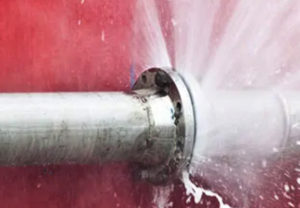
Pipes are a critical component of your home’s plumbing system, and a broken pipe can lead to a whole miserable host of issues, from water damage to costly repairs—and all that you can imagine falling between those two (somewhat loose) parameters. To wit: if you want to avoid pipe damage, it’s imperative to understand the most common causes and take appropriate preventive measures.
Read along for some plumbing-insider tips to keep those pipes in great condition—without any need for straining as you go.
Regular Maintenance
Neglecting regular maintenance of your plumbing system can (read: will) increase the risk of pipe damage. They can sneakily develop leaks, rust, and corrosion over time, which all serve to gradually weaken their integrity and eventually lead to failure. Schedule annual plumbing inspections by a licensed plumber to detect hidden leaks, identify potential issues, and ensure that everything is working efficiently.
Proper Food (Et Al) Disposal
“Incorrect” disposal of food scraps, grease, hygiene products, and other debris down your drains can cause clogs, corrosion, and eventually pipe damage. Avoid putting coffee grinds, eggshells, stringy vegetables, rice and pasta, meat and bones, oil or grease down your drains. These items can accumulate in your pipes and cause blockages, leading to increased pressure and potential pipe damage. Use strainers or screens over your drains to catch debris and dispose of them properly in the trash.
Tree Root Defense
Beleaf it or not (oof, sorry), tree roots are a very common cause of piping woes, especially in relation to sewer and water lines. As trees grow, their roots naturally tend to “seek out” nearby water sources, including—you guessed it—your pipes. …At which point they can effectively infiltrate the pipes, causing blockages, cracks, and, eventually, severe structural damage. To prevent this sort of tree root intrusion, take care that you avoid planting any “major” foliage along or even near your pipelines. If you have existing trees in this no-no zone, consider consulting with a licensed plumber for regular inspections and root pruning to keep things in check.
Weather Preparedness
Extreme weather conditions—most notoriously freezing temperatures—can cause pipes to expand and contract, causing small cracks and burst pipes. To avoid this manner of damage, take preventive measures such as insulating outdoor spigots, letting water faucets drip to relieve pressure, and leaving cabinets open under sinks to allow warm air to reach the pipes. The long and the short of it: staying proactive and vigilant during extreme weather conditions can and will help minimize the risk of pipe problems a-plenty.
Managing Water Pressure
High water pressure can seriously stress your pipes and appliances, leading to potential pipe damage. The standard/”normal” water pressure coming into your home should measure between 40-60 PSI. If yours is consistently above this range, it can cause major trouble over time. Best to have your water pressure checked by a licensed plumber at some point, and if it’s too high, consider a water pressure regulator to prevent pipe damage.
Closing Thoughts
Heed the advice above and your pipes will show their appreciation. Of course, generally speaking, remember to always follow best practices for plumbing care, and that whenever you encounter any troubling issues, it’s best to consult with a licensed professional right away to “extract” any monkey wrench—quite possible with an actual wrench.
For Pipe Repairs, Call Master Plumbing
Give Master Plumbing a call at (301) 650-9100, or contact us online to get more information on how our expert plumbers can help you with just about anything plumbing-related! We have received Angie’s List Super Service Award recognition for plumbing and drain cleaning every year since 2007, in addition to the Best Plumber award from Best of Bethesda. We are fully licensed, bonded, and insured, and our service is unparalleled. Give us a call today—you won’t regret it! To see examples of our projects, follow us on Facebook and Twitter!
